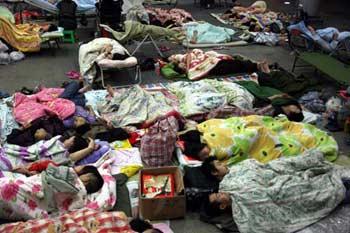China
Expert: China aftershocks may continue for months
Source: Xinhua | 05-27-2008 16:37
Special Report: Strong quake jolts SW ChinaBEIJING, May 27 (Xinhua) -- The aftershocks following May 12 earthquake that devastated southwest China are likely to continue for two or three months, said an expert on seismology.
 |
| Residents sleep outside to avoid the aftershock likely to happen in Chengdu, capital of southwest China's Sichuan Province on the early morning of May 20, 2008. The provincial seismological bureau in Sichuan forecasted on Monday night that an aftershock between 6.0 to 7.0 magnitude was likely to rock Wenchuan County on Monday or Tuesday, and warned local governments and people to be prepared for emergencies. (Xinhua/Wang Jianmin) |
"Judging from previous earthquakes of a similar magnitude, this time the aftershocks may last for two or three months, and it's not relatively long," said He Yongnian, former deputy director of China Seismological Bureau (CSB) and a seismologist, in an online interview on xinhuanet.com.
As of Monday noon, 182 aftershocks measuring above four on the Richter scale had been monitored in Sichuan, according to the China Seismological Bureau.
Five aftershocks measuring above magnitude six were monitored and the most recent at magnitude 6.4 on Sunday afternoon killed at least eight people.
"A strong earthquake, especially above 8.0-magnitude, will surely have aftershocks and they may go on for months," said He. The frequency and magnitude of the aftershocks tended to grow weaker as time passed, though they could fluctuate.
He pointed out Sichuan's mountainous terrain had increased the damage as landslides and quake lakes posed far-reaching threats to local people. If the quake had occurred in a flat area, it might have incurred much less damage.
In addition, he said, with present technology scientists were capable of ascertaining the magnitude and epicenter shortly after an earthquake, but it took longer to assess the scope of the damage as this could only be observed at the scene.
As local governments had their own emergency plans and were able to report the damage, it shortened the process a great deal, he added.
In response to questions on the odd behavior of animals before a quake, He said, "As far as we know, animals do indeed behave strangely before strong earthquakes, such as rats crossing roads and chickens roosting in trees. However, when animals behave strangely, it doesn't necessarily suggest quakes. An official organization cannot rely on that to forecast earthquakes. It's quite complicated."
The May 12 quake has killed 65,080 people and left 360,058 injured nationwide, according to the Information Office of the State Council.
Editor:Zhang Ning



